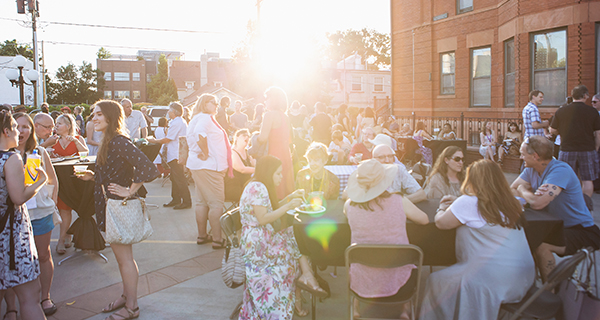
Editor's Note: This is the first in a series of essays and podcasts in which readers and writers from all corners of the Lighthouse Writers Workshop community express why they believe in our mission to elevate the literary arts. Please support these important programs on Colorado Gives Day, December 10, when every gift is boosted by a $1.5 million incentive fund. Save time by scheduling your gift today; just select “Colorado Gives Day” under frequency and your donation will be processed on the 10th and boosted by the incentive fund.
I moved to Denver 20 years ago. I’d spent the first 21 years of my life in Mississippi and the next eight years in Austin, Texas. I’d never lived in a place where it snowed more than once a decade. I’d never lived near mountains. I’d never lived without humidity or mosquitoes. I had no friends or family in Denver, just a job and a generic apartment. I figured I’d have plenty of time to myself, at least for a while, and I wanted that. I’d recently decided to get serious about my writing. I figured free time and solitude would make me more productive.
I was wrong.
I did not sit down and hammer out 300 pages over a few weekends. I wasn’t struck by inspiration at the first snowfall. Instead, I settled into my new job, bought my first parka, and my first pair of practical boots. I tried skiing. I went hiking. I ran, and marveled at how little sweat I produced in the dry air. I wrote, but I was no more prolific in Colorado than I’d been in Texas or Mississippi. I decided I’d been wrong about needing solitude and time. Maybe what I really needed was structure and accountability.
I signed up for a Lighthouse workshop during that first year in Denver. Lighthouse was young then: no historic homes, no fundraisers, no visiting authors, no Lit Fest. We met in living rooms. We nibbled cheeses and brushed cracker crumbs from our manuscript pages. We shared wine. We sat on old sofas and dining room chairs and, often, on the floor. I made friends with other writers and we’d get together sometimes to talk about books and about how god-awful hard it is to write anything good.
Sometimes we gathered in local coffee shops for readings. I remember one evening at Stella’s on South Pearl. We perched around tippy tables and tried to keep our mugs of coffee from crashing to the floor. Someone, I believe, brought wine. The room was overfull and warm and humming with a sort of happy, buzzy energy. One by one, writers stood and read poems, pages of fiction, bits of memoir. I was sitting next to a guy I’d met in one of my first workshops and he told me he was just there to listen. “I haven’t been writing at all,” he said.
The readings went on for a while. My cheeks ached from smiling and laughing so much. Then my friend leaned across the tiny table and said, “I’ll be back. Don’t leave.” He sprinted from the room. I didn’t know where he’d gone or why.
Finally, when the night was winding down, my friend reappeared. He was clutching a notebook and he read a brief passage for the crowd. It was different from the things he submitted at our workshops. Those pages were always careful and restrained and serious. These were experimental and weird and funny. After he read, he reclaimed his seat at the table. “What was that?” I asked. He said he didn’t know. He’d written it earlier that day and never intended to share it with anyone, but something about the evening and the readings and the people made him want to read it out loud. “I thought you weren’t writing at all,” I said. He shrugged.
This was the magic of Lighthouse. Even when you felt like you weren’t writing anything, you were probably writing something. Even when you were determined to sit back and listen, you ended up on stage. Even when you were living in a strange city where no one ever offered you boiled peanuts, you managed to feel at home.
In the past 20 years, I’ve learned that solitude and time and inspiration are great, but rare. None of those things make me a better writer or a more prolific one. I’ve learned how to write when I don’t feel like writing. I’ve learned how to write when I’m overscheduled and overstressed. I’ve learned how to write even when I don’t feel like I have much to say. And I learned all of that by connecting with other writers. I learned all of that by being part of a writing community.
Lighthouse was the first place where I felt at home in Denver, but it was never really a place. It was a roving group of people, all of us trying to do the same hard work. Lighthouse has outgrown the living rooms and coffee shops of those early days, but it is still the same community that inspired a writer to dash home and grab a handful of pages to share. It is still the same community where writers commiserate and celebrate as the situation dictates. It is still the same community that made a woman from Mississippi feel comfortable in a cold, dry climate where no one ever offers her boiled peanuts. And it still feels like home to me.
Tiffany Quay Tyson is the author of two novels, Three Rivers and The Past is Never. Published in 2018, The Past is Never is the recipient of the Willie Morris Award for Southern Fiction, the Janet Heidinger Kafka Prize, the Mississippi Institute of Arts and Letters award for Fiction, and the Mississippi Author Award for Fiction from the Mississippi Library Association. The paperback is available beginning November 12, 2019. Learn more at tiffanyquaytyson.com or follow her on Twitter (@tqtyson), Instagram (@tqtyson), or Facebook (facebook.com/tiffanyquaytyson/).

